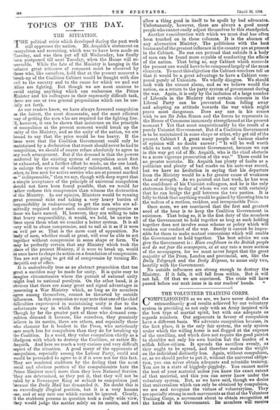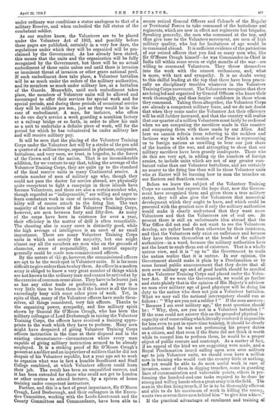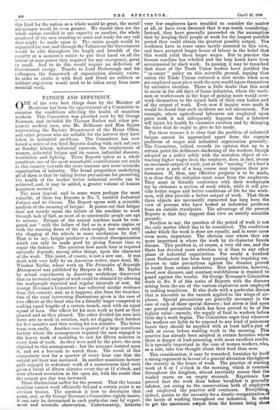THE VOLUNTEER TRAINING CORPS.
COMPULSIONISTS as we are, we have never denied the extraordinarily good results achieved by our voluntary system in providing us not only with an Army inspired with the best type of martial spirit, but with one adequate as regards numbers. Our arguments in favour of compulsion have a different basis. We advocate compulsion because, in the first place, it is the only fair system, the only system under which the willing horse is not flogged at the expense of the unwilling, and which does not require the good patriot to shoulder not only his own burden but the burden of a selfish fellow-citizen. It spreads the sacrifices evenly, as they ought to be spread, and therefore makes the weight on the individual distinctly less. Again, without compulsion, or, as we should prefer to put it, without the universal obliga- tion, you can never obtain adequate and scientific training. You are in a state of higgledy-piggledy. You cannot make the best of your material unless you know the exact extent of that material, and this you can never know under the voluntary system. But, as we have said, though we desire that universalism which can only be obtained by compulsion, we see and recognize the virtues of voluntaryism. They are specially strong in such movements as that of the Volunteer Training Corps, a movement about to obtain recognition. at the hands of the Government. Its members will receive under ordinary war conditions a status analogous to that of a military Reserve, and when embodied the full status of the combatant soldier.
As our readers know, the Volunteers are to be placed under the Volunteer Act of 1863, and possibly 'before these pages are published, certainly in a very few days, the regulations under which they will be organized will be pro- claimed by the Government. As has already been stated, this means that the units and the organization will be fully recognized by the Government, but there will be no actual embodiment of those units unless and until there is invasion or imminent threat of invasion or other grave national peril.
If such embodiment does take place, a Volunteer battalion will be as much under the orders of the military authorities, and its members ELS much under military law, as a battalion of the Guards. Meanwhile, until such embodiment takes place, the members of Volunteer units will be allowed and encouraged to offer their services for special work and for special periods, and during these periods of occasional service they will be soldiers pro tem., just as they would be in the case of embodiment. A man, for instance, who offers to do one day's service a week guarding a munition factory or a railway bridge or so forth, in order to allow his unit as a unit to undertake a definite piece of work, will for the period for which he has volunteered be under military law and will receive military pay.
It will be seen that the placing of the Volunteer Training Corps under the Volunteer Act will by a stroke of the pen add a quarter of a million troops, organized in platoons, companies, battalions, and very soon, we trust, in brigades, to the forces of the Crown and of the nation. That is no inconsiderable addition, for we venture to say that, taking the average of the Volunteer Training Corps, they are quite up to the standard of the final reserve units in many Continental armies. A certain number of men of military age who, though they could not pass the doctor for service abroad, are physically quite competent to fight a campaign in these islands have become Volunteers, and there are also a certain number who, though regarded as "indispensable," are willing and eager to learn combatant work in case of invasion, when indispensa- bility will of course attach to the firing line. The vast majority of the members of the Volunteer Training Corps, however, are men between forty and fifty-five. As many of the corps have been in existence for over a year, their efficiency in the matter of drill is often remarkable. The shooting also in many cases is distinctly good, while the high average of intelligence is an asset of no small importance. There are many Volunteer Training Corps units in which not merely the majority, but one might almost say all the members are men who on the grounds of character, sense of responsibility, and mental capacity generally could be made non-commissioned officers.
By the nature of thia gs, however, the commissioned officers are apt to be the weak spot in Volunteer units. It is far more difficult to give orders than to obey them. An officer in a modern army is obliged to know a very great number of things which are not known to the ordinary man and cannot be arrived at by the exercise of common-sense alone. They have to be learnt just as has any other trade or profession, and a year is a very little time to learn them in if the learner is all the time exceedingly busy with some other piece of work. Yet, in spite of that, many of the Volunteer officers have made them- selves, all things considered, very fair officers. Thanks to the organizing power, sympathy, and fine military spirit shown by General Sir O'Moore Creagh, who has been the military colleague of Lord Desborough in raising the Volunteer Training Corps, the officers have received a training appro- priate to the work which they have to perform. Many men might have despaired of giving Volunteer Training Corps officers instruction in the time at their disposal and in the existing circumstances—circumstances where every man capable of giving military instruction seemed to be already employed. It is a striking proof of Sir O'Moore Creagh's powers as a soldier and an improviser of soldiers that he did not despair of his Volunteer republic, but a year ago set to work to organize what was in fact a humble Sandhurst and Staff College combined, at which Volunteer officers could learn their job. The result has been an unqualified success, and it has been extended for those who could not get to London or other centres to attend lectures, by a system of home training under competent instructors. Further, and this is a fact of great importance, Sir O'Moore Creagh, Lord Desborough, and their colleagues in the Execu- twe Committee, working with the Lords-Lieutenant and the County Committees and Commandants, have been able to secure retired General Officers and Colonels of the Regular or Territorial Forces to take command of the battalions and regiments, which are now in effect not regiments but brigades.. Speaking generally, the men who command at the top, and thus give tone to the Volunteer movement, are men of high military quality, who but for limitations of age would be in command abroad. It is sufficient evidence of the patriotism of our retired officers that you find so many men who, like Sir O'Moore Creagh himself—he was Commander-in-Chief in India till within some seven or eight months of the war—are willing to command Volunteers. They throw themselves into the work with the utmost enthusiasm, and; what is more with tact and sympathy. It is no doubt owing to this skilful leading at the top that there have been practi- cally no disciplinary troubles whatever in the Volunteer Training Corps movement. The Volunteers recognize that they are being led and organized by General Officers who know their work thoroughly, and thus inspire confidence in those whom they command. Taking them altogether, the Volunteer Corps are already a competent military force, and we do not doubt that when they come under the Volunteer Act their efficiency will be still further increased, and that the country will realize that our quarter of a million Volunteers must fairly be reckoned when we are computing the sacrifices made in this country and comparing them with those made by our Allies. And here we cannot refrain from referring to the reckless and factious way in which a section of our Press is representing us to foreign nations as unwilling to bear our just share of the burden of the war, and attempting to show that our military sacrifices have been grossly inadequate. Those who do this are very apt, in adding up the numbers of foreign armies, to include units which are not of any greater com- batant value than our Volunteer battalions, and are certainly no nearer to the firing line than will be those Volunteer units who at Easter will be learning how to man the trenches on our Eastern and Southern coasts.
Before we leave the subject of the Volunteer Training Corps we cannot but express the hope that, now the Govern- ment have recognized them and given them a true military status, .they will also give the' Volunteers that numerical development which they ought to have, and which could be procured with the greatest ease if only the military authorities would make it clearly understood that they want more Volunteers and that the Volunteers are of real use. At present there is still an unfortunate idea abroad that the War Office did not and do not want to see the Volunteers develop, are rather bored than otherwise by their insistence, and that the Volunteers only exist on sufferance and because they have thrown themselves at the heads of the military authorities—in a word, because the military authorities have not the heart to snub them out of existence. That is a wholly untrue view, and it is "up to" the Government to make the nation realize that it is untrue. In our opinion, the Government should make it plain by a Proclamation or by some formal public announcement that they desire that all men over military age and of good health should be enrolled in the Volunteer Training Corps and placed under the Volun- teer Act. If we were the Government, we would go further and state plainly that in the opinion of His Majesty's advisers no man over military age of good physique will be doing his duty to the nation who does not join a Volunteer battalion. What we may call the national interrogatory should run as follows : "Why are you not a soldier?" If the man answers:: "Because I am over military age," the next question shouid be : "Why, then, are you not in a Volunteer battalion ? " If the man could not answer this on the ground of physical in- capacity or of some calling which literally rendered it impossible for him even to put in spare-time training, it should be clearly understood that he was not performing his proper duties as a citizen, and that even if the State did not think it worth while to compel him to perform them, he would be a proper object of public censure and contempt. As a matter of fact, if an appeal of the kind we are suggesting were made, and.a Royal Proclamation issued calling upon men over military age to join Volunteer units, we should soon have a million men in training who would cost the country little or nothing, and yet would be able to do most useful work in case of invasion, some of them in digging trenches, some in guarding lines of communication and vulnerable points, others in per- forming the hundred-and-one tasks required to be done by strong and willing hands when a great army is in the field. The man in the first filing trench, if he is to be thoroughly efficient and able to do his maximum of work in killing the enemy, wants two or even three men behind him" to give him a knee.
If the practical advantages of enrolment and training olf this kind for the nation as a whole would be great, the moral advantages would be even greater. We should then see the whole nation enrolled in one capacity or another, the whole manhood of the race standing to arms and ready for any call that might be made upon it. The entire people would be organized for war, and through the Volunteers the Government would be able throughout the length and breadth of the country at a moment's notice to put their hand on all the labour or man-power they required for any emergency, great or small. And to do this would require no deflection of Government energy. Thanks to Lord Desborough and his colleagues, the framework of organization already exists. In order to clothe it with flesh and blood no soldiers or military organizers would need to be taken away from more essential work.




























 Previous page
Previous page